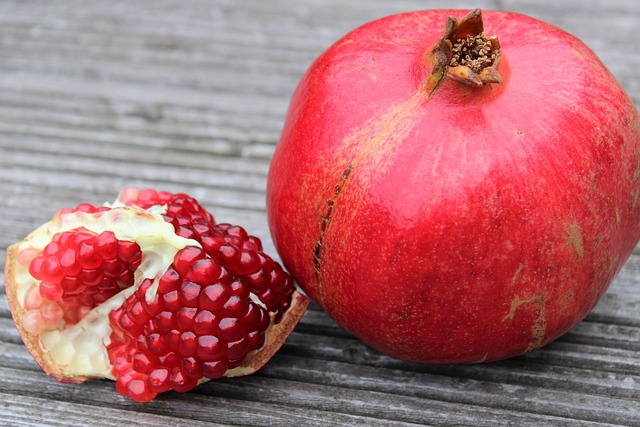Pomegranate juice is a nutrient-rich beverage that offers numerous health benefits. It is packed with essential vitamins, minerals, and powerful antioxidants. This guide will explore its nutritional content, bioactive compounds, and the scientific evidence supporting its health benefits.
Nutritional Breakdown of Pomegranate Juice
Pomegranate juice provides essential nutrients that contribute to overall health. Understanding its nutritional value helps us see why it is considered a healthy addition to any diet.
Vitamins and Minerals
Pomegranate juice contains important vitamins and minerals that support bodily functions:
- Vitamin C: A strong antioxidant that boosts the immune system and supports skin health.
- Vitamin K: Essential for proper blood clotting and maintaining healthy bones.
- Folate: Important for DNA synthesis and cell division, especially during pregnancy.
- Potassium: Helps control blood pressure and supports heart health.
- Magnesium: Contributes to muscle function and overall energy production.
As a result of these nutrients, regular consumption of pomegranate juice can help you meet your daily nutritional needs.
Macronutrients and Calories
Pomegranate juice is relatively low in calories and fat but rich in carbohydrates, primarily natural sugars like fructose and glucose. Here is a breakdown:
- Calories: Approximately 130-150 calories per 8-ounce serving.
- Carbohydrates: About 30-40 grams, mostly from natural sugars.
- Fat and Protein: Very low amounts, making it a light, refreshing beverage.
Though pomegranate juice contains natural sugars, the benefits of its antioxidants help balance its impact on blood sugar levels.
Key Active Components in Pomegranate Juice
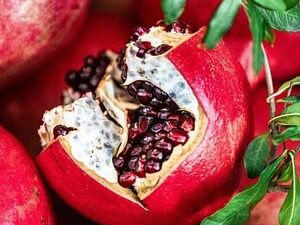
Pomegranate juice is packed with bioactive compounds that provide numerous health benefits. These compounds are primarily responsible for its antioxidant, anti-inflammatory, and cancer-fighting properties.
Polyphenols: Powerful Antioxidants
Pomegranate juice is exceptionally rich in polyphenols, which are strong antioxidants that protect the body from damage caused by free radicals. The two primary polyphenols in pomegranate juice are:
- Punicalagins: These unique compounds offer greater antioxidant effects than red wine or green tea.
- Ellagic Acid: A breakdown product of ellagitannins, ellagic acid provides anti-inflammatory and cancer-preventive benefits.
Polyphenols, therefore, play a critical role in improving overall health and reducing the risk of chronic diseases.
Punicalagins and Ellagitannins: The Key Players
Punicalagins and ellagitannins are the main bioactive components found in pomegranate juice. These compounds contribute to the following health benefits:
- Antioxidant Properties: Punicalagins reduce oxidative stress and prevent DNA damage.
- Anti-inflammatory Effects: Ellagitannins help lower inflammation in the body by blocking harmful inflammatory pathways.
- Cancer Prevention: Both compounds slow the growth of cancer cells and promote their destruction, particularly in prostate, breast, and colon cancers.
As a result of these compounds, pomegranate juice is considered a powerful natural remedy for various health issues.
Flavonoids, Anthocyanins, and Tannins
In addition to polyphenols, pomegranate juice contains flavonoids, anthocyanins, and tannins. These compounds provide several health benefits:
- Flavonoids: Help reduce inflammation and improve blood vessel function.
- Anthocyanins: Responsible for the red color of pomegranate juice, they protect against UV damage and oxidative stress.
- Tannins: Offer antimicrobial properties, helping to fight infections and promote digestive health.
Together, these compounds enhance the overall health-promoting effects of pomegranate juice.
Scientific Evidence Supporting the Health Benefits of Pomegranate Juice
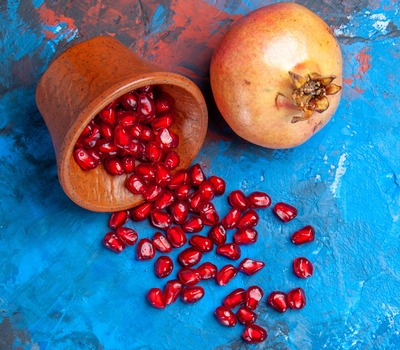
Many studies have demonstrated the health benefits of pomegranate juice. Its high concentration of antioxidants and bioactive compounds makes it an effective natural remedy for several health conditions.
Antioxidant and Anti-inflammatory Properties
The high levels of antioxidants in pomegranate juice help reduce oxidative stress and inflammation in the body. Scientific studies show that consuming pomegranate juice can:
- Reduce oxidative damage to cells and lipids, helping to prevent chronic diseases like heart disease and diabetes.
- Lower inflammation: By decreasing levels of inflammatory markers such as C-reactive protein, pomegranate juice may reduce chronic inflammation in conditions like arthritis.
Thus, regular consumption of pomegranate juice may help protect against inflammation-related diseases.
Cardiovascular Health Benefits
Pomegranate juice has been shown to improve heart health in several ways:
- Improved Blood Flow: The polyphenols in pomegranate juice improve blood vessel function and reduce arterial stiffness.
- Blood Pressure Control: Pomegranate juice lowers systolic blood pressure by inhibiting an enzyme involved in blood pressure regulation.
- Cholesterol Reduction: Regular consumption of pomegranate juice can reduce LDL (“bad”) cholesterol levels and prevent its oxidation, which is a key factor in the development of atherosclerosis.
These cardiovascular benefits make pomegranate juice an excellent choice for heart health.
Anti-cancer and Anti-aging Effects
Pomegranate juice is also known for its potential anticancer and anti-aging effects:
- Cancer Prevention: The bioactive compounds in pomegranate juice slow cancer cell growth and promote apoptosis (cell death) in prostate, breast, and colon cancers.
- Anti-aging Properties: Its antioxidants protect against free radical damage, which contributes to the aging process. By neutralizing these harmful molecules, pomegranate juice helps maintain youthful skin and overall health.
This makes pomegranate juice a natural choice for cancer prevention and maintaining a youthful appearance.
Other Health Benefits
In addition to its heart and anticancer benefits, pomegranate juice offers other health advantages:
- Improved Digestion: The tannins and fiber in pomegranate juice support healthy digestion and may prevent digestive issues.
- Joint Health: Pomegranate juice’s anti-inflammatory properties make it beneficial for people with arthritis and other joint problems.
- Immune System Support: With its high Vitamin C content, pomegranate juice helps strengthen the immune system and protect against infections.
These added benefits further highlight the versatility and effectiveness of pomegranate juice in promoting overall health.
Popular Dishes with Pomegranate Worldwide
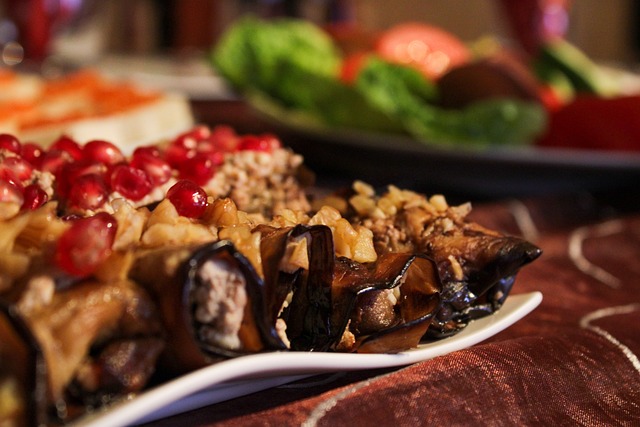
Pomegranate, a fruit loved for its sweet-tart flavor and rich color, is used extensively in global cuisines. It can be found in the form of fresh seeds, juice, or molasses, enhancing both savory and sweet dishes. Here’s a closer look at how pomegranate is used around the world:
Persian Fesenjan (Iran)
- Dish: Fesenjan is a traditional Iranian stew.
- Ingredients: Ground walnuts and pomegranate molasses.
- How it’s made: The dish is typically simmered with chicken or duck.
- Flavor profile: The pomegranate molasses brings a tangy sweetness that balances the richness of the walnuts.
- When it’s served: Often prepared for festive occasions, particularly during Yalda, the Iranian celebration of the winter solstice.
Lebanese Tabbouleh with Pomegranate (Lebanon)
- Dish: A variation of the classic Lebanese salad, tabbouleh.
- Ingredients: Parsley, bulgur wheat, tomatoes, and fresh pomegranate seeds.
- What pomegranate adds: The seeds add sweetness and acidity, contrasting with the citrus and herb flavors.
- Where it fits: Typically served as part of a mezze platter, alongside dishes like hummus and baba ghanoush.
Pomegranate-Glazed Chicken (Turkey)
- Dish: Pomegranate-glazed chicken is a popular Turkish dish.
- Main ingredient: Pomegranate molasses used to glaze chicken.
- Cooking style: The glaze caramelizes during roasting or grilling, creating a sticky, flavorful coating.
- What pomegranate adds: A tangy, slightly sweet flavor that balances the savory chicken.
- How it’s served: Often garnished with fresh pomegranate seeds and served with rice or bulgur pilaf.
Moroccan Couscous with Pomegranate (Morocco)
- Dish: A Moroccan couscous dish topped with fresh pomegranate seeds.
- Ingredients: Couscous, vegetables, lamb or chicken, and spices like cinnamon and cumin.
- Pomegranate role: The seeds add a burst of sweetness and texture to the savory, spiced dish.
- When it’s served: Typically during festive meals or family gatherings.
Pomegranate and Yogurt Parfait (Greece)
- Dish: A simple Mediterranean dessert or breakfast.
- Ingredients: Greek yogurt, fresh pomegranate seeds, honey, and nuts (often walnuts or pistachios).
- Pomegranate role: Adds a tart, juicy burst that balances the creamy yogurt and sweet honey.
- How it’s eaten: Often served as a refreshing summer treat, but enjoyed year-round.
Indian Pomegranate Raita (India)
- Dish: A yogurt-based condiment known as raita, with pomegranate seeds.
- Ingredients: Yogurt, pomegranate seeds, cumin, and sometimes mint.
- Pomegranate’s purpose: Adds sweetness and crunch to the creamy yogurt, balancing spicy Indian dishes.
- How it’s used: Typically served alongside rice dishes like biryani or spicy curries.
Georgian Pkhali with Pomegranate (Georgia)
- Dish: A vegetable and walnut spread, often made with spinach or beets.
- Ingredients: Ground walnuts, garlic, vinegar, and pomegranate seeds for garnish.
- What pomegranate adds: The seeds provide a bright, tangy contrast to the rich, nutty flavors.
- Where it fits: Served as a side dish or appetizer, especially at feasts.
Mexican Chiles en Nogada with Pomegranate (Mexico)
- Dish: A patriotic Mexican dish.
- Ingredients: Poblano chiles stuffed with ground meat and fruits, topped with a creamy walnut sauce and pomegranate seeds.
- Pomegranate’s purpose: Garnishes the dish, adding a burst of flavor and representing one of the colors of the Mexican flag.
- When it’s served: Commonly prepared during Mexican Independence Day celebrations.
Other Popular Uses of Pomegranate in Cuisine
Pomegranate isn’t just used in these specific dishes. Its juice, seeds, and molasses have a wide variety of applications in culinary traditions worldwide.
Pomegranate Juice
- Usage:
- Marinades and sauces: Often used as a base for marinades and glazes, especially for meats like lamb and chicken.
- Dressings: Adds a sweet-tart flavor to vinaigrettes and salad dressings.
- Drinks: Consumed as a juice or mixed into cocktails for a vibrant flavor.
Pomegranate Molasses
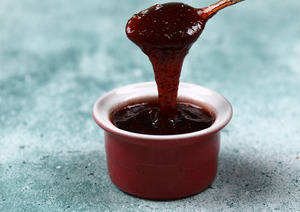
- Usage:
- Glazing meats: Adds depth and sweetness to roasted or grilled dishes.
- Sauces: Commonly used in Middle Eastern cuisine to thicken sauces or add a tangy undertone to stews.
- Dips: Often mixed into dips like baba ghanoush to provide an additional layer of flavor.
Fresh Pomegranate Seeds
- Usage:
- Salads: Adds color and a burst of flavor to green salads, grain-based salads, and fruit salads.
- Desserts: Often sprinkled over desserts such as yogurt bowls, parfaits, or cakes for added texture and brightness.
- Garnishes: Used to top savory dishes like rice, meats, and stews, providing a fresh, juicy contrast.
Health Benefits of Pomegranate in Cooking
Pomegranate isn’t just versatile and delicious—it’s also packed with health benefits:
- Rich in antioxidants: Helps reduce inflammation and may lower the risk of heart disease.
- Supports heart health: Studies suggest that pomegranate juice can help lower blood pressure and cholesterol levels.
- Aids digestion: The seeds are a good source of fiber, aiding in digestive health.
- Boosts immunity: High in vitamin C, pomegranates contribute to a strong immune system.
Table: Popular Pomegranate-Based Dishes and Their Origin
| Dish Name | Country of Origin | Description |
|---|---|---|
| Fesenjan | Iran | Rich stew made with walnuts and pomegranate molasses. |
| Tabbouleh with Pomegranate | Lebanon | Salad with parsley, bulgur, and pomegranate seeds. |
| Pomegranate-Glazed Chicken | Turkey | Chicken glazed with pomegranate molasses, often garnished with fresh seeds. |
| Couscous with Pomegranate | Morocco | Couscous topped with vegetables, meat, and pomegranate seeds. |
| Pomegranate Yogurt Parfait | Greece | Yogurt parfait layered with pomegranate seeds, honey, and nuts. |
| Pomegranate Raita | India | Yogurt-based dip with cumin and pomegranate seeds. |
| Pkhali with Pomegranate | Georgia | Spinach or beet puree garnished with pomegranate seeds. |
| Chiles en Nogada | Mexico | Stuffed poblano chiles with walnut sauce and pomegranate seeds. |
By incorporating pomegranate into dishes around the world, chefs and home cooks alike celebrate its ability to elevate both the flavor and presentation of meals. Whether in its fresh form, as a juice, or as molasses, pomegranate is truly a global ingredient.

